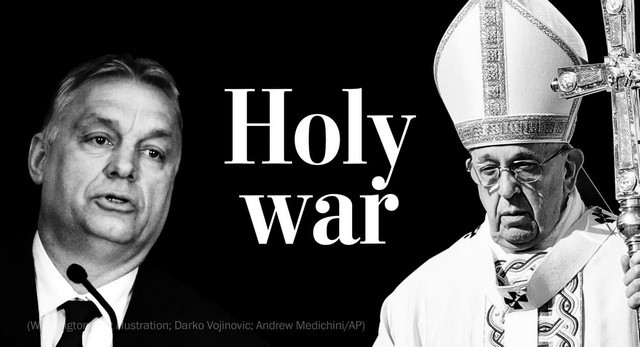By Ishaan Tharoor
As expected, right-wing Hungarian Prime Minister Viktor Orban won a third consecutive term on Sunday. His ruling Fidesz party secured more than two-thirds of the seats in parliament, a decisive mandate that many observers consider an ominous sign for the future of democracy in Hungary — and even the rest of Europe.
Orban ran a stridently anti-immigrant campaign, fixating on the phantom menace of Muslim migrants and refugees overwhelming Hungary. He repeatedly styled himself as the defender of Europe’s traditional Christian identity, likening an anti-migrant fence he erected on Hungary’s southern border to the ramparts of Western civilization. And he cast his enemies, both abroad and at home, as agents of an alien threat.
But there’s one actual leader of European Christendom who probably vehemently disagrees with Orban. On Monday, as the Hungarian leader basked in his victory, Pope Francis issued an apostolic exhortation on the subject of holiness. His message centered on the importance of caring for migrants, with the pope arguing that their plight should be as important to Catholics as their opposition to abortion.
“Our defense of the innocent unborn, for example, needs to be clear, firm and passionate,” the pope wrote. “Equally sacred, however, are the lives of the poor, those already born, the destitute, the abandoned.”
As the New York Times reported, the Vatican introduced the exhortation with a promotional video featuring a Muslim refugee from Afghanistan named Mohammad Jawad Haidari, who expressed his awe for the pontiff’s compassion. “It was a surprise, and a revolutionary text with respect of the vision I had before of the Christian world,” Haidari said in response to the pope’s new message.
As European politicians have turned to scaremongering over migrants, Francis has been conspicuous with his open-armed embrace of refugees. He bathed the feet of asylum-seekers from sub-Saharan Africa in 2016 and transported a group of displaced Syrians in his own plane. Those actions, along with his strong stance on refugees, have gained the pontiff a legion of critics among the far right and even within more conservative circles at the Vatican.
He has also had awkward dealings with clergy members in Hungary and Poland, both historically Catholic nations with right-wing nationalist governments that practice virtually the opposite of what the pope seems to preach.
Orban, though, did not risk a war of words with the head of the Roman church. Instead, he made Jewish American philanthropist George Soros, who has invested in promoting civil society and democracy in his native Hungary, into public enemy number one.
Orban said that Soros aimed to strike a “final blow to Christian culture” through his support for greater pluralism and compassion toward migrants. Anti-Soros messaging suffused the election campaign, which international monitors declared was “significantly compromised” by the ruling party’s overweening control over state television and even some commercial broadcasters.
Douglas Wake, the head of mission from the Organization for Security and Cooperation in Europe, told reporters in Budapest that Orban’s virulent anti-migration message subsumed the election cycle and marginalized the opposition. The “hostile and intimidating campaign rhetoric,” Wake said, “limited the space for substantive debate and diminished voters’ ability to make an informed choice.”
For his hard-line agenda — which reeked of anti-Semitism — Orban was swiftly congratulated by the doyens of Western Europe’s far right, who also oppose both Muslim immigration and the European Union’s fitful efforts to respond to the Syrian refugee crisis. These included Italian ultranationalist Giorgia Meloni, anti-Islam Dutch politician Geert Wilders and French far-right leader Marine Le Pen, who hailed Orban’s victory as a rejection of Brussels. Even German Interior Minister Horst Seehofer, who has said Islam has no place in his country, urged his liberal colleagues to drop their “arrogance and condescension” toward Orban in the wake of the election result.
With another term now in hand, Orban has become one of the continent’s most potent illiberal demagogues, bending the state to his favor and eroding the country’s fledgling democratic norms. Now his critics fear bigger moves to silence opposition to his rule.
“Approximately 2,000 people are working in Hungary to overthrow the government in the election campaign and replace it with a pro-immigration cabinet favorable to George Soros, as well,” Orban told state radio before the vote. “We know exactly, by name, who these people are and how they operate in order to turn Hungary into an immigrant country.”
As my colleague James McAuley reported, Orban and his allies intend to enact new legislation to crack down on civil-society groups it deems hostile to the government’s interests. “We can see an alarmingly fast crackdown on civil society, or independent voices, in Hungary,” Marta Pardavi, the co-chair of the Hungarian Helsinki Committee, a human rights group that works with migrants, said to McAuley.
Not unlike the nationalist grandstanding of autocrats in Russia and Turkey — whose politics Orban claims to admire — the Hungarian prime minister has used a culture war to entrench his rule. At home, his anti-immigrant, anti-E.U. sentiments helped him outflank the formerly neo-fascist Jobbik party on the right. Abroad, they helped him link up with leaders elsewhere in eastern and central Europe to build support for his defense of Europe’s Christian identity and his attack on what he famously called “the era of liberal babble.”
But his vision of Christendom is not shared in Rome, where the pope seems to have an inconvenient fondness for at least some “liberal babble.” In his exhortation, Francis pointed to how “welcoming the stranger” was fundamental to the Catholic faith, not a “a momentary fad” that happened to be “invented by some Pope.”
“That a politician looking for votes might say such a thing is understandable,” the pope wrote, “but not a Christian.”
Ishaan Tharoor writes about foreign affairs for The Washington Post. He previously was a senior editor and correspondent at Time magazine, based first in Hong Kong and later in New York.
10 April 2018

